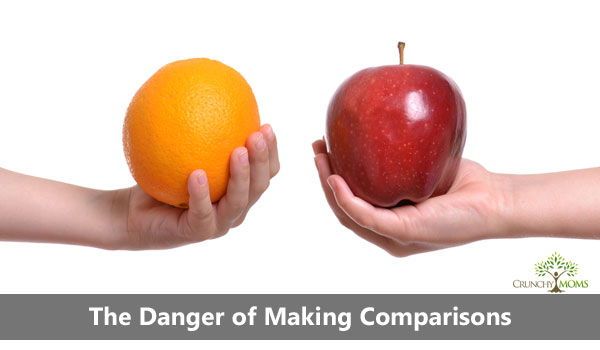Do you ever catch yourself making comparisons between your child’s development and others her age? Admittedly, I do this.
I feel bad when other moms compare their kids to mine, too. My toddler daughter’s verbal skills are very advanced for her age, but a friend’s son who is several months older isn’t, and she worries.
However, her son’s physical prowess far outshines my daughter’s. Further, he is more outgoing and my daughter is on the quiet side.
Here’s the funny thing: His mom and dad’s parenting style is very similar to my family. Both kids come from intelligent, middle-class families with stable lives and a stay-at-home mom and working dad. We live in the same community and attend the same church. Both families practice gentle discipline, breastfed, and cloth-diapered (at least for a period of time). Both babies were birthed naturally (no drugs). We follow healthy diets with our kids, read to them, play with them, and wore them a lot as infants.
So why are they so different? While both of us moms question if we are doing a “good enough” job playing the role of parent, the answer to our kids’ difference in developmental milestones is probably due to genetics, according to K.S. Berger, author of The developing person: Through childhood and adolescence.
Ah, the puzzle of “nature versus nurture.” This question has confounded us for hundreds of years. And, while I believe the choices we make as parents have a huge effect on our babies’ development, we should not beat ourselves up if our kids don’t measure up to the kids next door.
I’ve been caught in that trap. When my baby girl was born, she was colicky. With an undiagnosed lip tie and milk allergy, she was uncomfortable and cried constantly when she was awake. The first few months were excruciatingly difficult. There was nothing I could do for her, and I felt like I was failing as a mother. I wondered if I was attached “enough” because other attachment-babies weren’t as difficult as mine. I continued to breastfeed her with a fear of failure if I stopped. I put her in cloth diapers out of fear that the chemicals in disposables were hurting her in some way. I saw other babies her age, happy and content, with “crunchy” parents looking refreshed, and here I was with my constantly-screaming baby, feeling like a failure. It sent me into a downward spiral of depression. It became very difficult for me to be a mom to my baby because I was so consumed in fear and doubt.
When the reality of her genetic problems were finally discovered and remedied, she became the sweetest, most fun baby I had ever imagined and hoped for.
I still believe in the worth of the choices I made as a new mom, and believe they will help my little girl reach her fullest potential. But I want moms to know that if their babies don’t measure up to the baby next door, it’s probably not because you’re failing as a mother. If your little one is having problems that you can’t seem to solve on your own, seek help and give yourself a pat on the back for doing your best.
You’re doing a great job!

